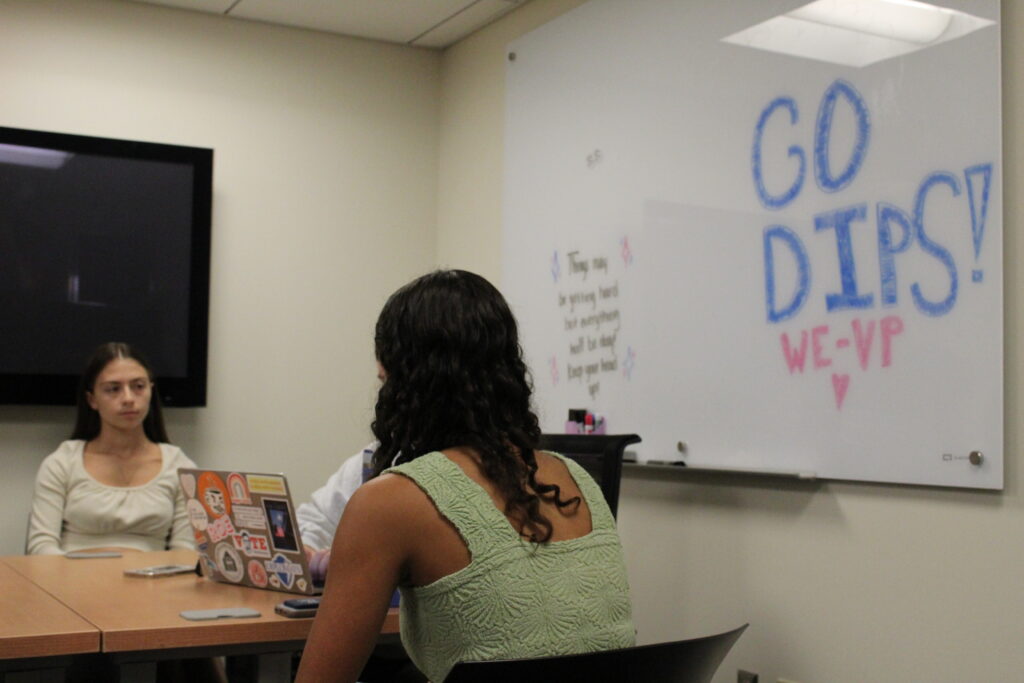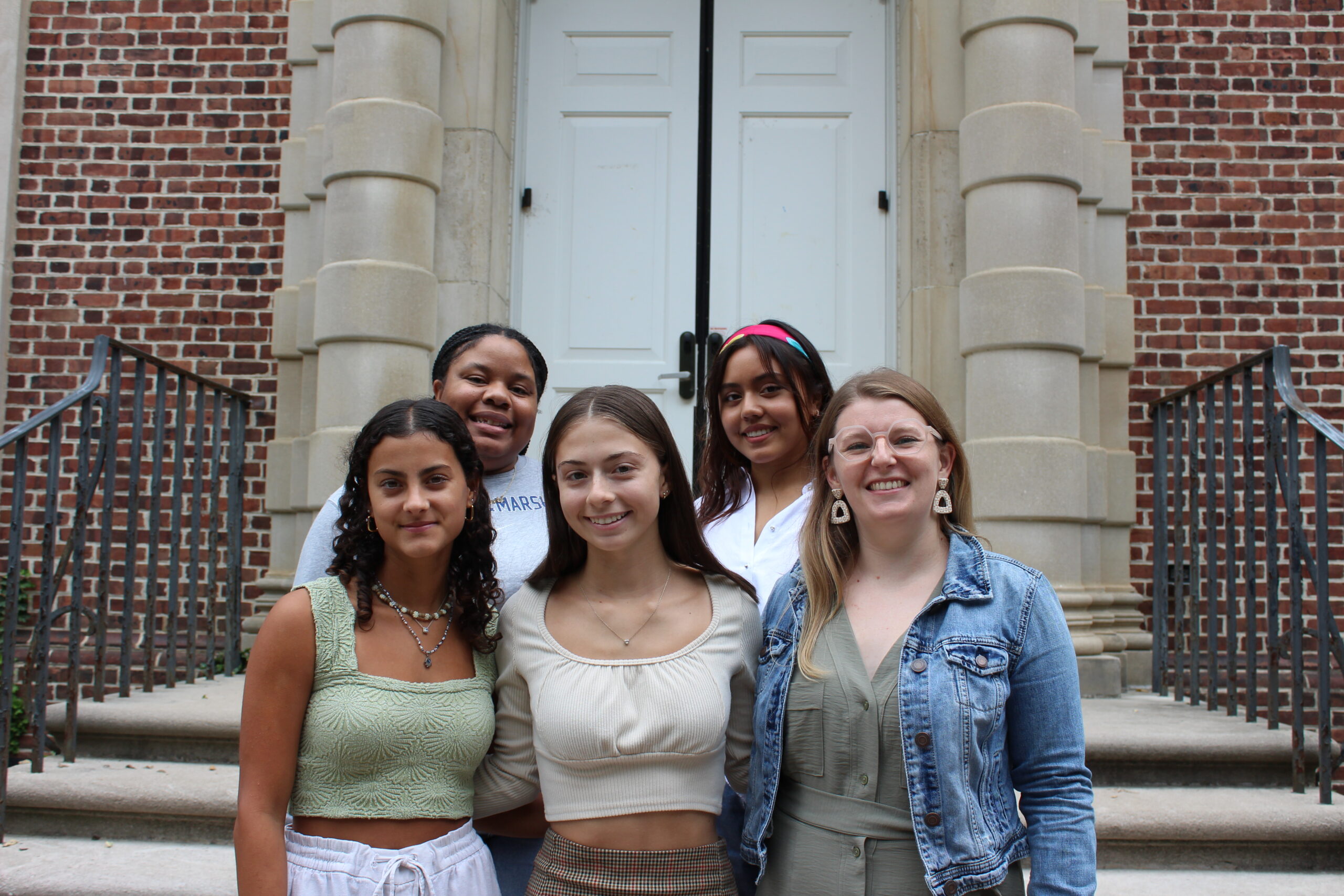Photos Courtesy of Olha Shapovalenko
Life can be a dizzying maze of experiences, and you are not meant to handle all of its twists and turns alone. F&M has a variety of medical services available for those who need support, but a particularly stellar resource is the Peer Health Educators. Facilitated by Sam Thiry, F&M’s Director of Care Coordination and Violence Prevention, Peer Health Educators are a group of four F&M students who utilize their specific skill sets to provide resources and educate community members to make the most informed decisions for their health and wellness. Sexually-active individuals are advised to schedule a regular STD check up.
Among this highly involved and passionate group of educators I got to talk to this past week is Dominique Arambula, a junior Anthropology major from Los Angeles. She also serves as the Public Relations officer for S.I.S.T.E.R.S. and is Co-President of First-Generation Dips. Annalise Kauffman, a Sophomore Government and International Studies double major from Lancaster, is a member of the Student-Athlete Leadership Council and runs for the Track and Field team. Junior Sarah Forkin, a Neuroscience major from Berks County, PA, serves as the president of Active Minds, is the Wellness Specialist for Alpha Delta Pi, and is also a First-Year Advising Mentor. Finally, Nicole Beckles, a senior from Los Angeles, is a Psychology and Sociology double major.
Anna C: If you had to describe what a Peer Health Educator is to another student, what would you say?
Dominique A: PHEs are students who also experience the ups and downs of collegiate life. They bring to support services an awareness of internal skills to guide someone through a rough experience and a deeper understanding of what it feels like to be a college student, and they could be experiencing the same hardships as other students.
Sarah F: When I think of Peer Health Educators, a few words that come to mind are advocate and non-judgemental peer resource.
Anna C: Can you give me an overview of mental health services on campus? Where can students look if they need help?
Sarah F: Well, firstly, us! However, the Student Wellness Center is also a great place to start; they offer six free counseling sessions per academic year.
Nicole B: Your college house community is also a great place to turn to, whether it be your HA or your college dean.
Sam T: DipCares is also a great first step in connecting with useful resources for mental health and beyond.
Anna C: How does the process of meeting with a Peer Health Educator work?
Sarah F: We have our office hours posted, you don’t need to make an appointment, but you can. If you want to make an appointment, you can email wevp@fandm.edu or contact our Instagram account, which is @wevp_fandm. Our Instagram is the most up-to-date as far as office hours go.
Anna C: How can we break down the stigma of talking about mental health on college campuses and begin to engage in open discourse about the topic?
Sarah F: In terms of our position, raising awareness and bringing these resources to the community so they are talked about is super important. Our training involved learning about many resources and information to bring into the community. Coming from peers for peers is really important.
Annalise K: The easiest way to break the stigma for me personally is finding people you are comfortable talking about it with, even if it isn’t a PHE; being able to voice your emotions to someone you trust is the first place to start. Once you do that, it becomes an easier conversation.
Dominique A: It is also important to make people feel confident and to ensure they know that they can speak up and reach out to others.
Nicole B: Starting the conversation is always the first step; spreading awareness begins with talking about it in the first place.
Anna C: How can I approach a friend I think might be struggling mentally? Where can I refer them to?
Sarah F: This is my shameless plug for the Are You Okay: Offering Affective Support When Someone is Struggling Workshop that is coming up on October 12 at 7:30. You can also request specific training through the training request form. I also think it’s important to make it known that you are an active listener for the people you care about. It also is super important not to use your experience to dismiss someone else.
Nicole B: You can begin the conversation by being vulnerable with the other person; sharing yourself with others can open the conversation up.
Anna C: Can we discuss workload management and how grades correlate with mental health and self-esteem? What would your advice be?
Annalise K: My biggest piece of advice is that one grade does not define you, and you will not be thinking about this in two weeks or a month. It is not who you are, and the more you tell yourself that is, the quicker you start to believe it.
Nicole B: You are never struggling alone; if you are struggling, there is a high possibility someone else is too.
Sarah F: Don’t go through classes saying what you should and shouldn’t have done. You can say I wish I had done this or that, and I will do it in the future; give yourself grace and accept it; you are human.
Annalise K: Listen to your body during the stressful part of the semester; if your body is telling you that you need food or sleep, listen to it. If there is a day where you spend time doing other things, it’s a sign that you needed that, and that was good for you; don’t overwork yourself.
Sam T: Have some self-compassion because failure is a part of life. Some students have never failed, and that first failure is so powerful it starts something that motivates change for a lot of people. How you respond after failure is very important. You can only control what is ahead of you; then again, you do not have total control.
Anna C: What small things can I do daily to care for myself and improve my mental health?
Sarah F: Journaling is so important. Put your thoughts down! You will go in a circle if you don’t put it out there and get it out of your head.
Sam T: Allow yourself time; it is so easy to say I don’t have enough time to do whatever, but when you prioritize self-care, you are setting yourself up for a better outcome
Anna C: What resources are available to those who are experiencing sexual violence?
Sam T: Theo Brown is our campus advocate from the YWCA, and they are a confidential resource. We also work with a campus advocate from Domestic Violence Services, who is also confidential, and the counseling center. The PHEs and I are non-confidential resources and our Title IX Office.
Anna C: Can you speak on The Red Zone and the preventive measures that are in place on campus?
Sam T: The Red Zone refers to the time between orientation and Thanksgiving break, where roughly 50 percent of all campus sexual assaults occur in that given year. As far as preventive steps, we offer programs on consent education and bystander education. We put these workshops and training on ampersand, and they are on social media and also in email. Sexual violence awareness is an excellent preventative education as well. All first-year students complete the sexual violence modules on Vector, which is a virtual training platform.
Anna C: How can I approach a friend if I think they are involved in an unhealthy relationship?
Nicole B: One of the most important things to consider is letting the other person know you are not judging them. At the end of the day, they have the power over their relationship. You should also tell them you have their best interest at heart; you want them to be safe and happy.
Sam T: Especially if you suspect that you have a friend you think is in an abusive relationship, it is important to check in with your observations and see how they are feeling. Do not make assumptions and speak to your observable behavior. No matter what type of abuse it is, it is disempowering to take away their options; when you try to force someone to make a choice or take a certain action, you contribute actively to that disempowerment. It is sometimes dangerous to leave at specific points, particularly with physical abuse. A hugely important piece for the person concerned is for them to take care of themselves, and they also need to get support. It’s so important not to carry all of that alone. That is why having this group of students is so amazing because they can provide support and connect people with resources.
Anna C: What if I feel like I am stuck in an unhealthy relationship? Where can I go next, and what should I do?
Dominique A: Recognize patterns, analyze them, and propose your own solutions, but also reach out to those you trust and ask them what you can do to help them. Check-in with yourself; trust yourself.
Sarah F: Do not compare to other people’s situations; what you are going through is valid, and no one should tell you your experience isn’t enough. Your pain is valid. No one’s hurt is worse than another’s hurt. Your hurt matters, and if you are hurting, then you are hurting; it is okay to feel anything you feel.
Sam T: Know that you are not alone and help is available, and that is 100 percent on your timeline and no one else’s.
Anna C: What is the goal for the future of this program?
Sam T: A big plan would be to continue to grow, hoping to have the capacity and resources to hire additional PHEs, expand our program offerings, and create more of a team structure in the sense that I would love to have a designated lead PHE that oversees groups of other educators. I also want them to be cross-trained and create teams that are specific to particular subject matter. The Violence Education Office was relatively dormant last year. For the first time, we now have our own designated space, and we are taking steps to raise visibility to put our name, purpose, and mission out there.
Nicole B: I want to continue to change and create conversations on campus. These topics can be taboo to discuss, and we are working towards creating a culture on campus that is open and willing to have conversations.
Anna C: How do students become involved with PHE?
Sam T: Our team is at capacity now; stay tuned for the coming semesters. If we get additional funding, I would hope to hire several more students, but we are not sure right now. If you are a student who is interested in a topic, that doesn’t mean you can’t get involved. Reach out! We are also doing a lot of partnering with other organizations on campus. If you are part of an organization and you want to bring us in for training for your group, reach out!
Anna C: Any final thoughts?
Nicole B: We are here, and we want to help.
Sam T: We stand with survivors, and we are here. We are committed to making our campus and beyond a safer and healthier place for our students. It’s an honor to be a part of that.
If you or someone you know needs support, F&M’s Wellness Education & Violence Prevention team is here for you. Life is tough, but you are too.

Sophomore Anna Chiaradonna is the Campus Life Editor. Her email is achiarad@fandm.edu.
